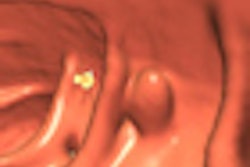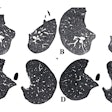Dear AuntMinnie Member,
In the Czech Republic, every pregnant woman receives prenatal ultrasound screening with echocardiography between 18 and 21 weeks of gestation.
How well has this national screening program performed? A research team led by Jan Marek, MD, found that the program detected major cardiac abnormalities in one-third of the patients born with any congenital heart disease (CHD) in the study period from 1986 to 2006.
It also diagnosed 80% of those deemed to have critical forms of the disease. And results have improved over time, according to the study published in Heart.
On the downside, mortality of antenatally diagnosed CHD patients remains high. For the details -- and what the study results might mean for other prenatal ultrasound screening programs -- click here or visit our Ultrasound Digital Community at ultrasound.auntminnie.com.
Minimal-prep VC shows promise
Nearly half of the eligible population elects to skip colorectal cancer screening of any kind, often due to concerns over the laxative bowel preparation required for both virtual and conventional colonoscopy.
But that patient excuse might be out the window someday, if researchers from Massachusetts General Hospital (MGH) and Harvard Medical School in Boston have anything to say about it. At the 2010 RSNA meeting earlier this month in Chicago, MGH's Michael Zalis, MD, described how a combination of minimal-prep VC, advanced electronic cleansing, and computer-aided detection yielded high sensitivity for colorectal adenomas in a cohort of more than 600 screening patients.
International editor Eric Barnes has our coverage of this important study, which you can read by clicking here or visiting our Virtual Colonoscopy Digital Community at vc.auntminnie.com.





















